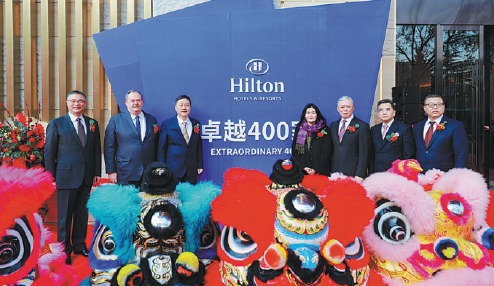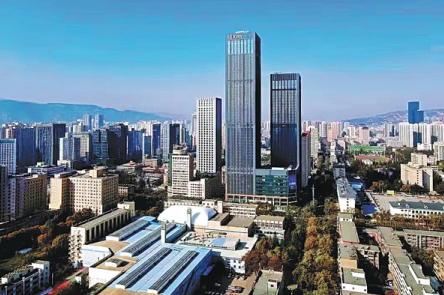Hilton primed for expansion in China
Group's growth forecast sees it opening 100 new sites a year despite pandemic

Hilton Group is looking to operate 500 hotels in China by the third quarter of next year, banking on a steady rebound of the hospitality industry in the country.
The projections made by Qian Jin, Hilton president for China and Mongolia, came on the heels of the grand opening of its 400th property in China. It is located in Lanzhou, capital city of Northwest China's Gansu province.
"Albeit overshadowed by the COVID-19 pandemic, we still managed to maintain the pace of opening 100 new hotels per annum over the past two years," Qian said. "We are learning to live with the contagion and treat it as a new normal, which spells both challenges and opportunities."
With 299 guest rooms, the Hilton Lanzhou City Center incorporates local natural scenery and cultural elements into its design. Qian said it marks an important milestone as Hilton expands into China's northwestern region.
"Lanzhou is an important hub in the Belt and Road Initiative. I hope our presence will bring vitality to this city, upgrade its travel and convention sectors, and bring a new growth engine to the business tourism industry."
The Lanzhou launch was in line with a broader goal of the hospitality group. It includes operating 1,000 hotels in China and boasting at least 50 million Hilton Honors members from the current 10 million by 2025.
The group expects digital reservations to account for more than half of its overall bookings within the time frame.
"We are on a steady course to reach this goal, despite uncertainties or temporary setbacks brought about by the pandemic," Qian said. "We may adjust speed, depending on different environments. But once temporary hindrances get cleared, we will up the ante and stride forward faster."
The company has taken a multi-pronged approach to fuel growth. On a high note, Hilton and Chinese real estate developer Shimao entered into an agreement earlier this year to launch four luxury hotels in four Chinese cities.
The new hotels-Waldorf Astoria Shenzhen, Conrad Shanghai, Conrad Wuhan and Conrad Zhuhai-will mark the introduction of Hilton's luxury brands in those cities. The Conrad Shanghai is scheduled to be revealed in January 2022.
"The tie-up with Shimao Group represents a big leap forward for our luxury portfolio, which also reflects our optimism in China's surging luxury travel segment," Qian said.
This resonates with a McKinsey study published in August, which pointed out that Chinese travelers are looking to experience local destinations and new travel offerings, particularly high-end travelers who are rejecting overseas trips because of the pandemic. Trends indicate that there is significant demand for outdoor experiences as well as integrated luxury offerings that act as alternatives to a traditional packaged tour.
Meanwhile, the company has teamed up with China's leading developer Country Garden to introduce its first extended-stay product, branded as Home2 Suites by Hilton.
Classified as an extended stay marque, the brand features hotel rooms that come with a separate living area and a kitchen. According to Qian, this fills the mid-to-high-scale market void of a hybrid flat offering homelike amenities in China.
He also cited examples of the Hilton by Hampton and Hilton Garden Inn, both of which provided ample growth momentum amid uncertainties due to the pandemic.
"We've learnt to navigate the sporadic outbreak of local transmissions and have formed a contingency plan. Typically, once a locally reported case is detected in megacities like Beijing or Shanghai, we manage to 'normalize' our operations within 40 days," he said.
There are signs that the effect from outbreaks in a single province is becoming more contained as the national market appears more resilient. For instance, McKinsey data showed stable hotel occupancy in June for Shanghai and Beijing and their surrounding areas.
Looking into the future, Qian said future travelers have the tendency to pursue simple, convenient travel experiences, value physical and mental wholesomeness, and support sustainability endeavors during their hotel stays.
"Sustainability, a long-term goal of Hilton and an inherent part of our strategy, is in sync with China's goals to reach carbon peak by 2030 and carbon neutrality by 2060," Qian said.
"One of our slogans at Hilton is to 'travel with purpose'. We will see how that plays out in light of these new trends."


Today's Top News
- Xi hails progress in Hong Kong, Macao
- Foreign ministers of China, Egypt call for Gaza progress
- Shield machine achieves Yangtze tunnel milestone
- Expanding domestic demand a strategic move to sustain high-quality development
- Xi hears report from Macao SAR chief executive
- Xi hears report from HKSAR chief executive






























